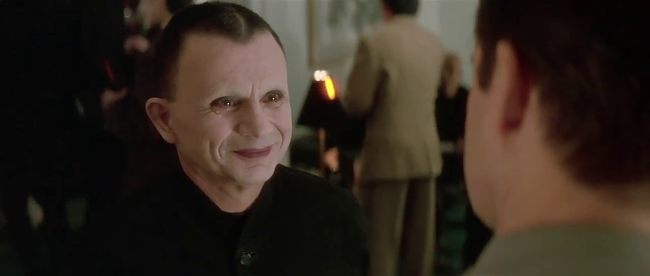Director: David Lynch
And Lynch gets Lynchier. If you're in the right mood, this is a very good thing.
This movie follows professional jazz saxophonist Fred Madison (Bill Pullman), who one day receives a mysterious VHS tape from an unknown source. This sets off a sequence of confusing and frightening events that lead to Fred's arrest for murdering his wife Renee (Patricia Arquette), a horrific act which is seemingly caught on tape but of which Fred has no memory. While in prison awaiting a death sentence, Fred inexplicably into a young mechanic, Pete Dayton (Balthazar Getty). A dazed Pete is released by the flummoxed prison warden and returns to his life at an auto repair shop. There, he restarts a relationship with an organized crime boss, the intimidating and brutal "Mr. Eddie" (Robert Loggia). Pete begins an affair with Mr. Eddie's mistress Alice, a platinum blonde lookalike of Renee Madison. At Alice's pleading, Pete begins taking revenge on Mr Eddie and others who Alice claims forced her into the pornography industry. Along the way, Pete transforms back into Fred, who completes the grisly task of killing Mr Eddie and his gangsters.
Lost Highway was David Lynch's seventh feature-length film, nearly all of which I've seen (except 1990's Wild at Heart). Of those first six films, I find Lost Highway to be the most distinctively his, featuring nearly all of the traits that film lovers associate with the eccentric filmmaker. There is mystery, murder, beautiful women, and at least one man stuck in the middle of sinister forces. There are also supernatural elements involving swapped personalities, possible doppelgangers, and even suggestions of time travel. In short, it's not a straightforward narrative or story in any traditional way. It's also the most sex-drenched of any of his movies, even the sometimes disturbingly graphic Blue Velvet. It can all be a bit much to take, if you're not in the right headspace for it. But if you are, it's a fascinating visual and narrative exploration of many primal, human forces that often seem to underscore Lynch's movies and shows. My attempts to unravel what, exactly, was happening with Fred Madison and his wife (?) had me pondering some deeper, more profound possibilities regarding sex and violence and how they can be intertwined. These are themes explored really well in the David Cronenberg classic A History of Violence, but Lost Highway offers us a dark, hallucinatory fantasy version of it.
And Lynch gets Lynchier. If you're in the right mood, this is a very good thing.
This movie follows professional jazz saxophonist Fred Madison (Bill Pullman), who one day receives a mysterious VHS tape from an unknown source. This sets off a sequence of confusing and frightening events that lead to Fred's arrest for murdering his wife Renee (Patricia Arquette), a horrific act which is seemingly caught on tape but of which Fred has no memory. While in prison awaiting a death sentence, Fred inexplicably into a young mechanic, Pete Dayton (Balthazar Getty). A dazed Pete is released by the flummoxed prison warden and returns to his life at an auto repair shop. There, he restarts a relationship with an organized crime boss, the intimidating and brutal "Mr. Eddie" (Robert Loggia). Pete begins an affair with Mr. Eddie's mistress Alice, a platinum blonde lookalike of Renee Madison. At Alice's pleading, Pete begins taking revenge on Mr Eddie and others who Alice claims forced her into the pornography industry. Along the way, Pete transforms back into Fred, who completes the grisly task of killing Mr Eddie and his gangsters.
Lost Highway was David Lynch's seventh feature-length film, nearly all of which I've seen (except 1990's Wild at Heart). Of those first six films, I find Lost Highway to be the most distinctively his, featuring nearly all of the traits that film lovers associate with the eccentric filmmaker. There is mystery, murder, beautiful women, and at least one man stuck in the middle of sinister forces. There are also supernatural elements involving swapped personalities, possible doppelgangers, and even suggestions of time travel. In short, it's not a straightforward narrative or story in any traditional way. It's also the most sex-drenched of any of his movies, even the sometimes disturbingly graphic Blue Velvet. It can all be a bit much to take, if you're not in the right headspace for it. But if you are, it's a fascinating visual and narrative exploration of many primal, human forces that often seem to underscore Lynch's movies and shows. My attempts to unravel what, exactly, was happening with Fred Madison and his wife (?) had me pondering some deeper, more profound possibilities regarding sex and violence and how they can be intertwined. These are themes explored really well in the David Cronenberg classic A History of Violence, but Lost Highway offers us a dark, hallucinatory fantasy version of it.
Lost Highway is just a mind-bender. I could probably watch it ten more times, coming up with a new theory each time as to what is happening and why. But rather than find this frustrating, I actually enjoy it. For me, this is a surreal movie in all the right ways. It taps into a dreamlike (or nightmarelike, to be more precise) wavelength that defies simple interpretation, which is what some of the best works of art do. I've been on a monster David Lynch kick lately, having watched every Twin Peaks episode and movie, Eraserhead, Blue Velvet, and now Lost Highway. And I'm still eager to rewatch Mulholland Drive and maybe even see Inland Empire, one of the few of his I haven't watched before. As unusual and challenging as Lynch movies can be, I'm still on board.

No comments:
Post a Comment